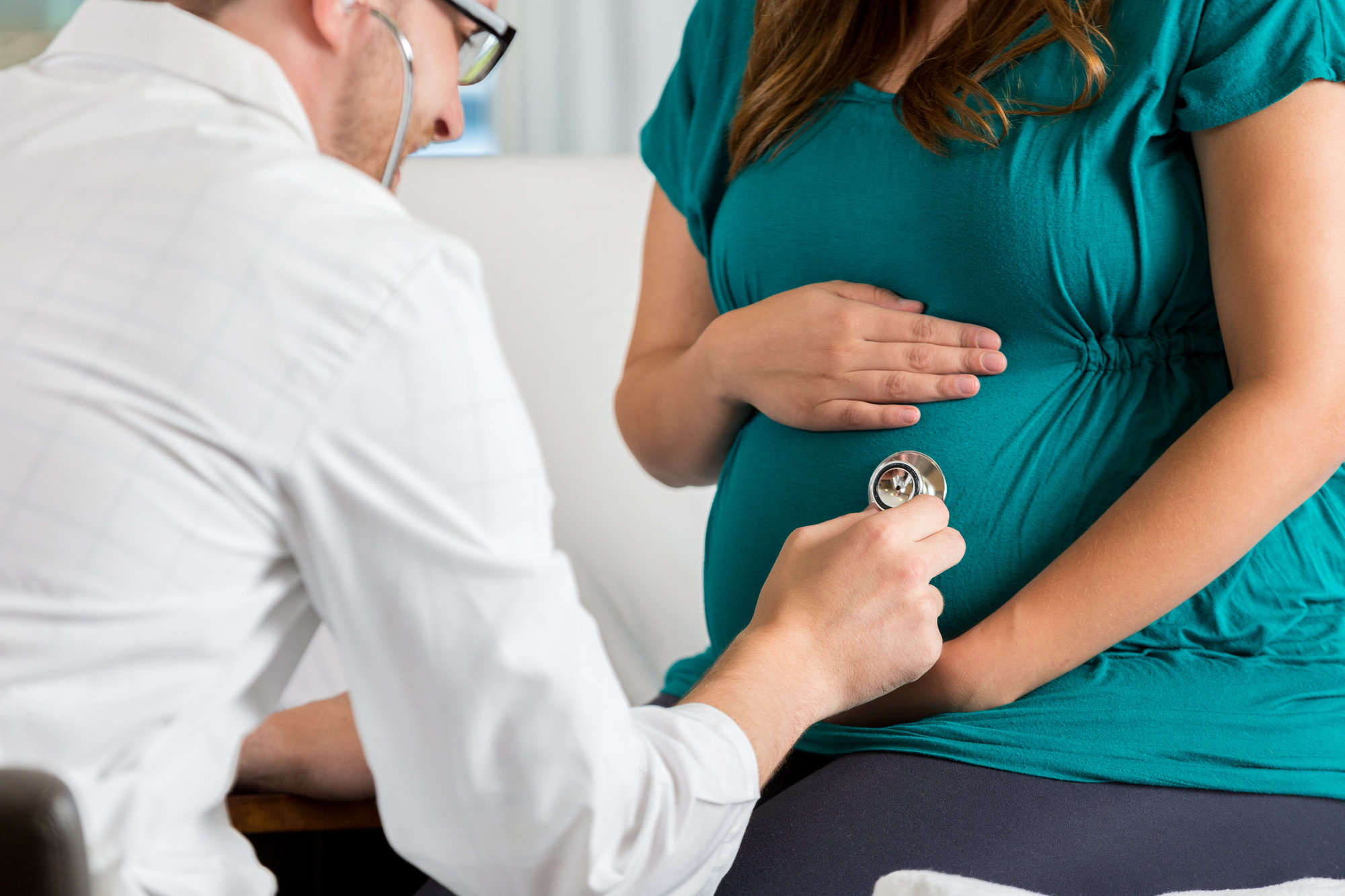
This article is part of a series dedicated to providing support and visibility to plus-size pregnant mothers. To read more stories, visit Plus-Size, Pregnant & Proud. To apply to join our private community on Facebook, click here.
Doctor knows best! Or at least that's what we're led to believe. The reality is that care providers are human beings — they make mistakes and have personal biases. And given the fat-shaming culture we live in, these biases all too often extend to plus-size women. Yes, most providers are working in your best interest, but when it comes to having exceptional medical care for you and your baby, it's critical to connect with a size-friendly care provider.
I'll never forget Hilary's story, which she shared on my website, PlusSizeBirth.com:
"'You are too obese to give birth vaginally, so you will be having a C-section.' These are the first words I remember my ob-gyn saying to me. I was 5.5 weeks pregnant and weighed in at 211 lbs. I left his office stunned. As I drove home crying, the guilt washed over me. How could this be? How could I do this to myself?"
As a first-time mom, Hilary was quick to blame herself rather than wonder if what her care provider was telling her was evidence-based. It wasn't! The American College of Obstetricians and Gynecologists does not recommend cesarean birth only based on a person's weight.
When an ob-gyn or midwife has a bias against people of size, it directly impacts the care their larger patients receive. I reached out to ob-gyns and midwives to ask what plus-size pregnant people should consider red flags in discussions with potential care providers. Along with being told you need a C-section based only on your weight, if you're told any of these things (or some variation thereof), consider finding a new provider.
"Wow, you're a pretty large woman to be pregnant!"
If your care provider makes you feel ashamed of your size, he or she is clearly not a size-friendly provider. In recent years, studies have proven that shame is not an effective tool when trying to encourage someone to make healthy choices. When a care provider shames a person of size, the patient is more likely to gain weight and less likely to receive routine medical care. You deserve to be treated with dignity.
More from CafeMom: 14 Shops for Plus-Size Pregnant Women & Expert Tips for Killer Maternity Style
"If you hear a provider using derogatory weight terms, or other epitaphs that make you uncomfortable, this is likely not a therapeutic relationship for you," warns Dr. Loralei L. Thornburg of the University of Rochester Medical Center. "However, I would say that appropriate counseling about risks of medical conditions, including extra monitoring or testing that may be needed to help you have your best pregnancy, are things that you SHOULD expect. And if you find that you have a provider that isn't experienced with women of size, and isn't willing to have frank and honest discussions about your care, weight gain goals, and how to be a team, that may also be a red flag."
"You will have a big baby because of your size."
Plus-size women are at an increased risk for fetal macrosomia (a baby weighing more than 8 lbs, 13 oz), but this doesn't mean you'll automatically have a big baby. Why does this assumption matter? If your provider is expecting your baby to be exceptionally large, you may be at risk of early induction or cesarean. There's evidence that the risk of these interventions may in some cases outweigh the clinical concerns about having a big baby.
"A red flag can be when a provider pressures you into induction before your due date because they suspect your baby is large," says Leslie Hamlett, ND, of the Canyon Medical Center. "The standards I use for achieving and maintaining optimal health during pregnancy apply to all of my patients, regardless of their size. Everyone benefits from 20 minutes of moderate exercise most days of the week, a diet free of refined sugars and high in carbohydrates, a minimum of eight hours of sleep, and half their body weight in ounces of water. The basics apply to all pregnant women."
"This is the same size blood pressure cuff I use for all my patients."
"Be aware if a provider's office does not have a variety of different sized blood pressure cuffs and does not automatically use the correct one. Or if the provider seems 'put out' to have to use an appropriate sized cuff," cautions Aubre Tompkins, CNM.
More from CafeMom: 11 Places to Buy Plus-Size Nursing Bras That Fit Every Bust & Budget
Your provider needs to have the proper equipment to care for you, and that includes the correct size blood pressure cuff. When your blood pressure is taken with a cuff that is too small, you'll get an inaccurate reading which can lead to either too much or not enough follow-up care. If you have a large upper arm, it's important you speak up if a nurse or your provider doesn't swap out the cuff for one that is the right size for you.
You'll also want to make sure your care provider has a comfortable place for you to sit in their waiting area, a scale that properly measures your weight, larger gowns, and more than one size speculum.
"Your child will be unhealthy because you got pregnant at this size."
"Your health-care provider shouldn't shame you by telling you that you can't have a healthy child because of your size," says Dr. Kathryn Drennan of the University of Rochester Medical Center. "Women who are overweight … deserve to be treated with respect and care."
As we've covered, plus-size people do face increased risks during pregnancy; however, those risks don't mean a woman or her child is guaranteed to have complications. Around 70 percent of plus-size moms-to-be report their pregnancies were either "pretty good" or "fantastic." So making a woman feel as though she is harming her child because of her weight goes beyond shaming; it's completely irresponsible. If your provider is making you question your ability to have a healthy child — run!
"Why are you questioning my recommendation? This is what's best for you."
Your ob-gyn or midwife knows more about pregnancy and birth than you do, but you know your body better than anyone else! Sadly, it's not uncommon for plus-size people to feel like they don't have a voice when it comes to the care they receive. The reality is you have every right to question your care provider and to receive a second opinion! Unless there's a medical emergency, there's always time to have all of your questions answered and concerns addressed.
More from CafeMom: 15 Insanely Offensive Things People Actually Said to Plus-Size Pregnant Women
"I think all too often women are put in these power play relationships where they feel that the relationship is one-way and [they're obligated] to not question the provider," says Jenn Ochse, CNM. "When it seems that conversations are one way, authoritarian, and don't value your 'mama gut' reaction or thoughts, then it's not somebody who is going to be truly in a respectful, supportive relationship."
I'll leave you with these words of wisdom from my own prenatal care midwife, Eliza Burelle, on how to know if your care provider is size-friendly.
Remember, you deserve to be treated with dignity and it's never too late to get a second opinion or switch to a new care provider.







